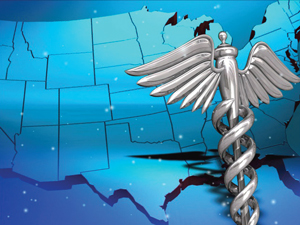U.S. health worse than nearly all other industrialized countries
By Carey L. Biron, IPS | Last updated: Jan 29, 2013 - 9:44:43 AMWhat's your opinion on this article?

The unusually high levels of population who lack health insurance in the U.S. would certainly seem to be one factor at work here. In 2010, some 50 million people, around 16 percent of the population, were uninsured—a massive proportion compared with the rest of the world’s high-income countries. |
Of 17 high-income countries looked at by a committee of experts sponsored by the National Institutes of Health, the United States is at or near the bottom in at least nine indicators.
These include infant mortality, heart and lung disease, sexually transmitted infections, and adolescent pregnancies, as well as more systemic issues such as injuries, homicides, and rates of disability.
Together, such issues place U.S. males at the very bottom of the list, among those countries, for life expectancy; on average, a U.S. male can be expected to live almost four fewer years than those in the top-ranked country, Switzerland. U.S. females fare little better, ranked 16th out of the 17 high-income countries under review.
“We were stunned by the propensity of findings all on the negative side—the scope of the disadvantage covers all ages, from babies to seniors, both sexes, all classes of society,” Steven H. Woolf, a professor of family medicine at Virginia Commonwealth University and chair of the panel that wrote the report, told IPS. The report was released Jan. 9.
U.S. citizens have for decades been dying at younger ages than those in nearly all other industrialized countries. The committee looked at data going back to the 1970s to note that such a trend has been worsening at least since then, with women particularly affected.
“A particular concern with these findings was about adolescents, about whom we document very serious issues that, again, stand out starkly from other counties,” Prof. Woolf says.
“Not only do they risk being killed in greater numbers, but they are also experiencing illness, and a variety of mental health concerns, at far higher rates than similar cohorts in other countries. These include significant implications for tomorrow’s adults.”
The unusually high levels of population who lack health insurance in the U.S. would certainly seem to be one factor at work here. In 2010, some 50 million people, around 16 percent of the population, were uninsured—a massive proportion compared with the rest of the world’s high-income countries.
Barack Obama winning of a second term, coupled with a decision by the Supreme Court, will now undercut most attempts by critics to roll back the president’s new health-care provisions.
And yet, according to the new findings, the insurance issue has relatively little impact on the overall state of poor health in the United States.
“Even advantaged Americans—those who are White, insured, college-educated, or upper income—are in worse health than similar individuals in other countries,” the report states.
Indeed, some of the few categories in which U.S. citizens are found to do better than their peers include smoking less tobacco and drinking less alcohol. They also appear to have gained greater control over their cholesterol levels and blood pressure.
At the same time, Americans have begun to suffer inordinately from a host of problems that can contribute to additional health concerns.
Sky-high obesity rates, for instance, are undergirded by findings that people in the U.S. on average consume more calories per person than in other countries, as well as analysis that suggest that the U.S. physical environment in recent decades has been built around the automobile rather than the pedestrian.
Americans not only record far lower health indicators on average, but also score far lower on seemingly unrelated issues—for instance, experiencing inordinate numbers of homicide and car accidents.
Related news:
Failing health in U.S. equals rising costs (FCN, 12-13-2013)
Supreme Court hears 'Obamacare' arguments (FCN, 04-05-2012)
Bridging the gap in health care coverage for children (FCN, 06-27-2010)
Harvard study: 45,000 uninsured Americans die every year (FCN, 09-24-2009)
Congressional cowards and health care reform (FCN, 07-07-2009)
The connection between wealth and health (FCN, 06-06-2006)
INSIDE STORIES AND REVIEWS
-
-
About Harriett ... and the Negro Hollywood Road Show
By Rabiah Muhammad, Guest Columnist » Full Story -
Skepticism greets Jay-Z, NFL talk of inspiring change
By Bryan 18X Crawford and Richard B. Muhammad The Final Call Newspaper @TheFinalCall » Full Story -
The painful problem of Black girls and suicide
By Charlene Muhammad -National Correspondent- » Full Story -
Exploitation of Innocence - Report: Perceptions, policies hurting Black girls
By Charlene Muhammad -National Correspondent- » Full Story -
Big Ballin: Big ideas fuel a father’s Big Baller Brand and brash business sense
By Bryan Crawford -Contributing Writer- » Full Story






 Click Here Stay Connected!
Click Here Stay Connected!








